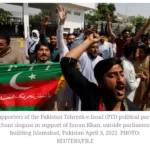Islamabad: The European Union (EU) has voiced apprehensions regarding human rights issues in Pakistan, particularly emphasizing cases of forced disappearances, media constraints, and the military’s significant role in politics. In a joint monitoring report released on Tuesday as part of the evaluation of Pakistan’s Generalized Scheme of Preference (GSP-Plus), the EU highlighted areas of concern and called on Islamabad to implement protective laws for economic, social, and political rights.
Key Points from the Report:
1. Forced Disappearances and Torture:
Expressing concerns over human rights violations, the EU pointed out cases of forced disappearances and torture. It urged Pakistan to implement laws safeguarding economic, social, and political rights in line with international treaties.
2. Military’s Role Despite Civilian Rule:
Despite continuous civilian rule since 2008, the EU report noted an outsized role of the military in Pakistan’s politics and economy. This observation raises questions about the extent of civilian governance in the country.
3. Corruption and Political Use of Legal Cases:
The report highlighted concerns about “pervasive corruption” and the political use of anti-corruption rhetoric and legal cases. It stressed the need for transparency and accountability to address these issues effectively.
4. GSP-Plus Status and International Conventions:
The GSP-Plus status, awarded to Pakistan in 2014, provides duty-free access to European markets based on the country’s commitment to implementing 27 international conventions. The report urged continuous legislative reforms to ensure tangible improvements.
5. Enforced Disappearances and Military Trials:
The EU raised alarms about enforced disappearances, citing 1,875 new cases reported to the Commission on Forced Disappearances. It expressed concern about civilians being tried in military and anti-terrorism courts after the May 9, 2023 riots.
6. Media Freedom and Journalists’ Challenges:
Despite legislative progress, the report noted challenges to media freedom, citing pressure and harassment on journalists. Pakistan ranked 150th out of 180 countries in international press freedom rankings. The report highlighted attacks on journalists and cases of online trolling.
7. Concerns Over Trials in Military Courts:
The EU emphasized concerns about the trial of civilians in military courts, questioning compliance with international conventions guaranteeing the right to a trial by an impartial tribunal. The Supreme Court of Pakistan has already intervened by halting such trials.
8. Focus on Economic Impact and GSP-Plus:
The report acknowledged the economic impact of GSP-Plus, contributing to increased awareness of human rights, labor rights, and environmental considerations. It urged Pakistan to diversify exports for the full realization of GSP-Plus benefits.
9. Challenges in Human Rights and Labor Rights Implementation:
While recognizing legislative efforts in human rights, the report highlighted challenges in effective implementation. Issues such as child labor, forced labor, and discrimination against women in the labor market persisted.
10. Media Freedom and Expression Restrictions Persist:
Despite legislative advancements, the report noted persistent restrictions on media freedom and freedom of expression. Instances of self-censorship among journalists were reported, impacting the ability to report objectively.
In conclusion, the EU report urged Pakistan to address these concerns comprehensively, emphasizing the importance of practical application alongside legislative reforms for the well-being of all citizens.



